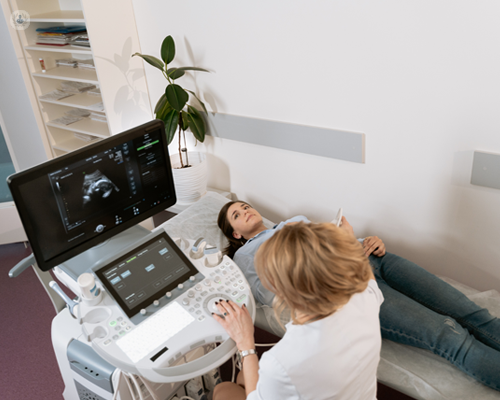Ectopic pregnancy and what you should know
Escrito por:Leading consultant obestetrician and gynaecologist Ms Shikha Kapur tells us all about what you should know about ectopic pregnancy in this article, which has been adapted for Top Doctors after being published in the Telegraph newspaper.

What is an ectopic pregnancy?
Whether planned or unplanned, discovering you are pregnant is a landmark moment filled with hope, concern and many questions. But what if you are one of the thousands of women in the UK each year who are told their pregnancy is ectopic? What then? Ectopic pregnancy is one of the most searched for terms during pregnancy meaning it’s a real source of anxiety among women.
Let’s begin with the etymology: the term ‘ectopic’ means ‘out of place’ so an ectopic pregnancy is one where the fertilised egg has implanted in the wrong place – outside the uterus. In the vast majority of cases (95 per cent), the pregnancy will have begun to develop within one of the fallopian tubes, but other less common sites include the cervix, ovaries and abdomen. Three per cent of ectopic pregnancies are termed ‘interstitial’, meaning they occur in the part of the fallopian tube that crosses into the uterus, but occasionally eggs also attach themselves to the uterine wall or even to a Caesarean section scar.
Ectopic pregnancies are relatively common; according to the Ectopic Pregnancy Trust, a charity established to raise awareness and inform and support patients and professionals, 1 in 80 pregnancies is ectopic with 12,000 women in the UK diagnosed every year - although anecdotally the number is thought to be much higher. [Source: The 2016 MBRRACE Confidential Enquiries into Maternal Deaths and Morbidity 2009–14.] Undiagnosed ectopic pregnancies can be life-threatening as the embryo begins to grow. A recent report showed that ectopic pregnancy remains the most frequent cause of maternal death in early pregnancy [Source: The 2022 MBRRACE Report 2018-20]. Tragically, an average of three women a year die from ectopic pregnancy in the UK and Ireland.
An ectopic pregnancy cannot be saved. Small wonder then that it can be traumatic and that National Institute for Clinical Excellence issues guidelines to healthcare professionals around the support of those going through ectopic pregnancy, including advice on communicating sensitively and how to signpost counselling. [Source: NICE GUIDELINE NG126 Ectopic Pregnancy and miscarriage: Diagnosis and Initial Management.https://www.nice.org.uk/guidance/ng126/chapter/Recommendations#support-and-information-giving]
What can cause an ectopic pregnancy?
Unfortunately, the cause of an ectopic pregnancy cannot always be identified. ‘Causes, or risk factors of ectopic pregnancy, are a source of much interest and continued investigation’, says Professor Tom Bourne, Consultant Gynaecologist at Queen Charlotte and Chelsea Hospital and Chair in Gynaecology at Imperial College London. ‘Our current understanding suggests anything that has damaged the fallopian tube or caused it not to function properly increases risk. Damage can be a result of previous infection or surgery, while dysfunction can come about because of age, smoking or, rarely, emergency contraception use. We know that endometriosis and Pelvic Inflammatory Disease can cause both damage and dysfunction. In those with pre-existing tubal damage, IVF may increase the risk of ectopic pregnancy. However, it’s important to note that for many if not most women, ectopic pregnancies occur without any known risk factors.’
While it’s useful to think about causes, it’s also good to realise there are misconceptions surrounding ectopic pregnancy. There is much disinformation online which can be unhelpful. For example, ectopic pregnancy isn’t hereditary and also, there’s no evidence to support ideas it’s linked to intense exercise or flying.
Who is most at risk from an ectopic pregnancy?
Anyone capable of conceiving, who is sexually active or undergoing assisted reproduction can suffer an ectopic pregnancy. In my work as consultant in early pregnancy with London Gynaecology Clinic and at West Hertfordshire NHS Trust, I see many women who are shocked by the news. Many women diagnosed with an ectopic pregnancy have no identifiable risk factor. If you have had a previous ectopic pregnancy this increases your risk of having another. If you have had pelvic inflammatory disease secondary to a pelvic infection or if you have had previous pelvic surgery (sterilisation, caesarean section or tubal reconstruction) this further increases your risk. Subfertility, assisted reproductive techniques such as IVF and having an intrauterine contraceptive device also poses risk for an ectopic pregnancy.
Smokers are another ‘at risk’ group. Research by the University of Edinburgh shows how they have an increased level of the protein PROKR1 in their Fallopian tubes. This can hinder the progress of a fertilised egg, increasing the chances of ectopic pregnancy. [Source: https://www.pure.ed.ac.uk/ws/portalfiles/portal/13541195/The_Association_between_Smoking_and_Ectopic_Pregnancy_Why_Nicotine_Is_BAD_for_Your_Fallopian_Tube.pdf]
What are the most common symptoms of an ectopic pregnancy?
Some women don’t experience any symptoms or can mistake them for other issues. The first question to ask yourself is: ‘Have I missed a period?’. Ectopic pregnancy is always a possibility if your reply is yes. Common symptoms include vaginal bleeding or spotting, and tummy pain either low down or on one side. This pain may come and go. Lesser-known red-flags A&E doctors are trained to spot include pain or pressure when going to the toilet, diarrhoea, feeling faint or ‘shoulder tip’ pain.’ ‘This latter is an unusual pain felt at the point where your shoulder meets your arm and can be a sign of internal bleeding.
What should i do if you think you’re at risk of an ectopic pregnancy?
It’s reassuring to learn that there are over 200 early pregnancy assessment units across the UK dedicated to caring for women with complications in early pregnancy including ectopic pregnancy. The Association of Early Pregnancy Units website (aepu.org.uk) has a location tool to help find your nearest centre. Referrals are usually made by a GP. However, some units allow self-referral.
‘If you have mild symptoms but feel generally well, your first port of call should be either your GP or your local Early Pregnancy Unit’, advises Professor Bourne. ‘Early Pregnancy Units will carry out a scan to check the location of the pregnancy, possibly blood tests to measure the level of the pregnancy hormone hCG (human chorionic gonadotropin). and arrange any follow up or treatment that may be required.’
Both of us emphasise the need to seek immediate help if symptoms worsen, however: ‘If you feel unwell, dizzy, nauseous or have shoulder tip pain, do not delay getting seen,’ says Bourne. ‘Go immediately to your nearest hospital emergency department - they can then contact the gynaecology services within that hospital for prompt review and appropriate treatment.’
How is an ectopic pregnancy diagnosed?
Almost all ectopic pregnancies are diagnosed by being directly visualised using an internal (trans vaginal) ultrasound scan, explains Bourne: ‘A thin probe is inserted into the vagina in order to scan the cervix, womb, fallopian tubes and ovaries in detail. A transvaginal scan is used in early pregnancy and we get more detailed images than using a probe on the abdomen. In some cases (about 10-15 per cent), we will not be able to see the location of the pregnancy on the scan. This may be because the ectopic pregnancy is relatively small, or because the scan has been carried out very early. In these circumstances we measure levels of the pregnancy hormone hCG (human chorionic gonadotropin) 48-hours apart to decide how often to arrange follow up – and repeat scans until it is clear where the pregnancy is located.’
How is an ectopic pregnancy treated?
Once diagnosed there are three types of treatment available: Expectant Management, Medical and Surgical. What you are offered will depend on the location and progression of the pregnancy and be specific to your case.
Expectant Management offered in the very earliest stages is the least invasive and means active monitoring via levels of the pregnancy hormone hcG to see if the pregnancy dissolves by itself.
Medical treatment may be offered if there is minimal pain but hCG levels increase. This involves an injection of Methotrexate which blocks the enzymes in the body which maintain the pregnancy. It stops the tissue from growing preventing rupture. The pregnancy tissue is eventually reabsorbed by the body.
If the patient develops significant pain, or there is concern about internal bleeding these approaches may have to be abandoned and laparoscopic (keyhole) surgery is carried out.
Are there long-lasting implications of an ectopic pregnancy?
Although most women recover relatively quickly after treatment - following non-surgical management, the ectopic pregnancy mass is soon reabsorbed while after surgery, women usually require two weeks to physically heal - there are long-term physical implications post ectopic pregnancy.
‘Having an ectopic pregnancy increases the risk of having another in the future due to fallopian tube damage from scarring,’ says Professor Bourne. ‘There may also be a slight reduction in fertility following expectant or medical management, but the previously affected fallopian tube may still function well. Following surgery, operating on or removing a tube does reduce fertility, but by 30 per cent rather than 50 per cent.’
Emotional healing can take a good deal longer and the psychological impact of such a pregnancy loss is profound. NICE guidelines recommend women and their partners receive counselling. Ectopic pregnancy has a huge impact, so we always refer couples to the Ectopic Pregnancy Trust and we also advise seeing their GP for a follow up and to talk through fears around getting pregnant again. A GP should also signpost counselling services for long-term support.
‘Critically, we know that a significant proportion of women following early pregnancy loss and ectopic pregnancy have anxiety, depression and post-traumatic stress symptoms that persist for at least 9 months and possibly for years if not treated,’ says Bourne. ´We’re working hard as a research group to better support these women and investigate potential screening treatment strategies.’
Concerned about ectopic pregnancy? Arrange a consulation with Ms Kapur via her Top Doctors profile.


